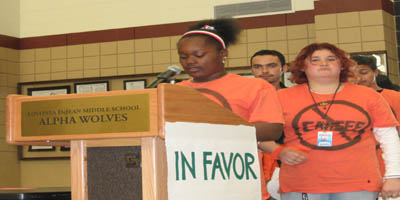POOR Magazine Youth intern who didn’t pass the Exit Exam reviews the legal challenges that were recently decided on.
 |
|
by Antonio William/PNN Youth in Media "How can they talk about us standing on corners, using drugs, we are hard-working students trying to get an education," a Latina Richmond High School Student wiped tears from her eyes as she spoke into the corporate media lens. She was speaking outside a school board hearing in April on the California High School Exit Exam(CAHSEE). Earlier this month two major legal challenges to the CAHSEE were heard and adjudicated on in California courts. The first one: Liliana Valenzuela, et al v. Jack O’Connell, which was fought by attorneys Arturo Gonzalez and Chris Young from Morrison and Foerster on the basis of the educational, due process and equal protection rights afforded to students under the California Constitution. We won this one. Alameda County Judge Robert Freedman decided on Friday May 11th to delay diploma denial for the class of 2006. When issuing the injunction, Freedman said he was swayed by Gonzalez's argument that low-income of color students, English language learners in particular attend low-performing schools that do not prepare them adequately for the test. Of the 46,700 seniors who have failed the test, 20,600 are designated as limited English learners and 28,300 are very lo-income. I am one of those 28,300 students. We lost the second challenge. Brought on by Californians for Justice, represented by attorney John Afeldt from Public Advocates, It alleged that the California State Board of Education and State Superintendent of Public Instruction Jack O'Connell had violated a state education law which required them to study alternatives to the CAHSEE after initial administrations of the exam back in 2001 and 2002. State education officials did not complete the study of alternatives I am a 17 year High School Senior. I failed the Exit Exam. Due to the delay ruling of the first challenge I might have a chance to receive a diploma as I am in the class of 2006. But what about my younger brothers and sisters? This question brings me back to the April action in West Contra Cost County (WCCUSD). The California High School exit Exam (CAHSEE) was being challenged by West Contra Costa School Board member, Dave Brown. The young woman I quoted and hundreds of other youth and community members who marched into the hearing that day were speaking to the media after the WCCUSD rejected a proposal which would have acted as an alternative to the California High School Exit Exam (CAHSEE). Brown had worked for many weeks with members of the policy Institute, Justice Matters, who works on racial justice in education, as well as conscious youth activists from Youth Together, to create an alternative to the CAHSEE which included completing all of their high school requirements as well as presenting a “Senior Year Demonstrationâ€. According to Multiple Measures Approaches to High School Graduation published by the School Redesign Network at Stanford University, alternatives are currently being used by several states such as Oregon, Vermont, Washington and Maine. The Stanford Study stated that rather than being detrimental to student learning, alternatives such as the Senior Year Demonstration encourages an ambitious range of thinking and performance skills in students who participate. So why can’t Jack O’Connell understand that? Or better yet why doesn’t Jack O’Connell listen to us, the students struggling with resource-poor, arts-poor and skilled- teacher poor schools. Struggling under endless test preps and no real teaching. My editor, tiny, at POOR/PNN who also works as the Communications Director at Justice Matters encouraged me to watch, listen to and read all the Exit Exam coverage with a critical eye. Who is heard on this issue, and who is listened to, she queried, as those voices, as we have been taught at POOR, helps to frame the issue to society at large. As I, a young African/Latino PoorNewsNetwork reporter watched the young Latina student of Richmond High School capture a corporate media minute in April and spit truth, I felt hope. As I, a young African/Latino high School student watched a young person of color question a stereotype to thousands of corporate media viewers, I felt possibilities. As I, a young brother of color who failed the exit exam watched resistance to the racist and classist Exit Exam. I didn’t feel like completely giving up. At least through the media lens, I felt like we were listened to. Maybe sometime in the future we will be heard. |



